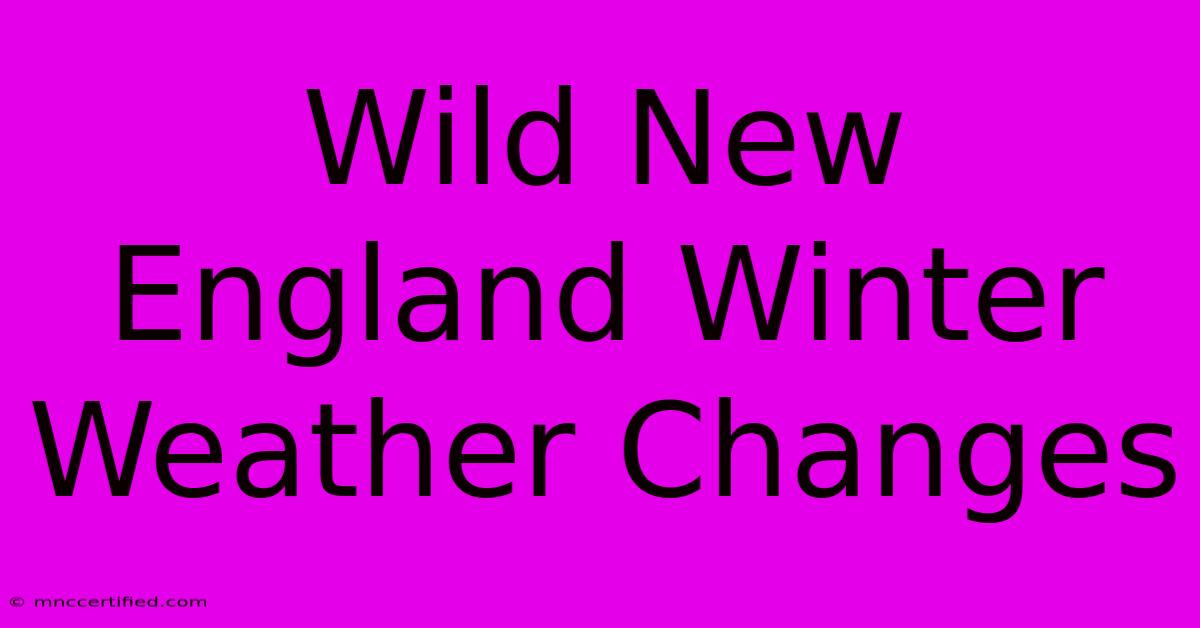Wild New England Winter Weather Changes

Table of Contents
Wild New England Winter Weather Changes: A Deep Dive into Recent Trends
New England winters, renowned for their iconic blizzards and bone-chilling temperatures, are undergoing a dramatic transformation. This isn't just about a few warmer days; we're seeing significant shifts in weather patterns that demand our attention. This article delves into the recent changes in New England's winter weather, exploring the causes and implications of these dramatic shifts.
Warmer Temperatures: The Most Obvious Change
One of the most noticeable changes is the increase in average winter temperatures. While we still experience periods of intense cold, the overall trend shows a clear warming pattern. This isn't just anecdotal; data from the National Oceanic and Atmospheric Administration (NOAA) confirms a significant rise in average winter temperatures across New England over the past few decades. This leads to reduced snowfall, shorter winter seasons, and a profound impact on various ecosystems and industries.
Impact of Warmer Temperatures:
- Reduced Snowpack: Ski resorts face shorter seasons and reduced snowpack, impacting tourism and local economies. This necessitates increased reliance on expensive snow-making, adding to operational costs.
- Coastal Erosion: Warmer winters contribute to sea level rise and more frequent coastal erosion events, threatening coastal communities and infrastructure.
- Changes in Wildlife Behavior: Animal migration patterns, hibernation cycles, and overall survival rates are affected by the changing temperatures.
Increased Frequency of Extreme Weather Events
While average temperatures are rising, this doesn't mean milder winters. In fact, New England is experiencing an increased frequency of extreme weather events, including:
- More Intense Snowstorms: Though overall snowfall might decrease, the storms that do occur can be more intense and unpredictable, leading to significant disruptions.
- Severe Ice Storms: Freezing rain events are becoming more common, causing widespread power outages and transportation challenges.
- Nor'easters with Increased Intensity: These powerful storms, known for their ferocious winds and heavy precipitation, are potentially becoming more intense due to warmer ocean temperatures.
The Role of Climate Change
The scientific consensus overwhelmingly points towards climate change as the primary driver of these observed changes. The increase in greenhouse gases is trapping heat in the atmosphere, leading to a warming planet and affecting weather patterns globally, including in New England.
Adapting to the Changing Climate
Understanding these changes is crucial for adapting to the future. Both individuals and communities need to prepare for:
- Investing in resilient infrastructure: This includes upgrading power grids to withstand severe weather events and implementing better coastal protection measures.
- Developing drought-resistant landscaping: Communities need to consider water conservation strategies, especially during periods of reduced snowfall.
- Supporting sustainable tourism practices: Ski resorts and other tourism-related businesses must adapt to changing conditions and diversify their offerings.
- Supporting research and monitoring: Continued data collection and research are vital to understanding and predicting future weather patterns.
Conclusion: A Call to Action
The changing winter weather in New England is a stark reminder of the impacts of climate change. It's not just about a few warmer days; it's about a fundamental shift in our environment that requires collective action. By understanding the challenges and implementing proactive measures, we can strive to mitigate the negative impacts and build a more resilient future for New England. This demands collaboration between governments, businesses, and individuals to address this critical issue effectively. The future of New England's iconic winters depends on it.
Keywords: New England winter weather, climate change, extreme weather, snowfall, ice storms, nor'easters, warming temperatures, coastal erosion, wildlife, adaptation, resilience, sustainable tourism, NOAA, climate change impact, New England weather patterns, winter weather changes.

Thank you for visiting our website wich cover about Wild New England Winter Weather Changes. We hope the information provided has been useful to you. Feel free to contact us if you have any questions or need further assistance. See you next time and dont miss to bookmark.
Featured Posts
-
Jamie Foxx Suffers Brain Bleed
Dec 12, 2024
-
Crochet Traded To Red Sox
Dec 12, 2024
-
Live Football Dortmund Juventus Stuttgart
Dec 12, 2024
-
Jewelry Store Assault Mayweathers Statement
Dec 12, 2024
-
Westwood Guilty Verdict In Rape Case
Dec 12, 2024